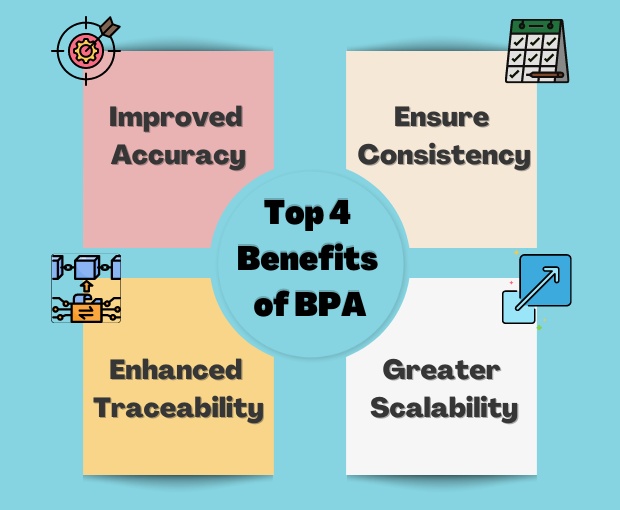Definition of Business Process Automation (BPA)
Business Process Automation (BPA) is a practical solution to simplify your work and make things run smoothly in your company. It uses advanced technology, particularly ERP systems, to create digital workflows in your business by automating repetitive, complex workflows.
By doing so, duplicated effort and human-prone errors are greatly reduced. This results in more productive and consistent business operations where real-world workflows become easier to follow and everything is held to the same high standard across the organization.
In today’s fast-changing market, it is crucial to stay ahead of your competitors and be able to keep up with the changes. By having effective business process automation in place, you can achieve just that!
6 Common Examples of Business Process Automation
It is not common for a company to automate only a single workflow, but rather, entire business workflows across the organizations are automated to maximize optimization.
Here are 6 common examples of business process automation:
Customer onboarding
Customer order processing
Inventory management
Product reordering
Invoicing
Expense and accounts payable processing
Top 4 Benefits of Business Process Automation
With business process automation, you will see improvements everywhere in your business from improved data accuracy to increased business sales and revenue.
Here are 4 benefits you will enjoy from automating your business operations:
Improved accuracy
Ensure consistency
Enhanced traceability
Greater scalability

Improved accuracy
We know how easily we can get sidetracked, forgetful, or overwhelmed when performing tedious, mundane tasks. Even skilled employees make mistakes sometimes.
That is why ERP systems come in to help. With automation, ERP systems don’t forget like humans do and can take over monotonous tasks where mistakes are more likely to occur.
Because automated integration eliminates the need for repetitive manual data entry, allowing the data and information to flow to the right places seamlessly.
This results in fewer errors and more accurate, high-quality data, ensuring everyone in the company look at the same data to make informed decisions.
With business process automation in place, your employees can complete the tasks faster to focus their time on more valuable tasks and work with confidence, knowing they won’t make costly mistakes.
Ensure consistency
We have all seen it happen, different people handle the same process differently, which can lead to inconsistencies. But with business process automation, these inconsistencies become a thing of the past!
Based on the rules you predefined, you can expect automated workflows to be carried out exactly the same way every time they are triggered, without skipping steps, making typos, or miscalculating. Standardized business workflows will reduce the variables that make it difficult for tracking and tracing.
With consistent workflows in place, automation increases transparency across your organization. You and your team can easily identify and track the progress, bottlenecks, and areas for improvement to streamline the business processes and address them as early as possible.
So, you will encounter fewer unexpected issues, less confusion, and less time wasted on redundant work in your business, improving the overall business productivity significantly.

Enhanced traceability
When a company faces issues like data loss or misconduct, it can be difficult to understand what is the root cause without clear and reliable audit trails.
But, with business process automation, you can gain real-time visibility into the status of processes and workflow. Because business process automation keeps a detailed record of every aspect of a business process automatically, including the date, time, and the person responsible, as part of its audit trail.
This helps organizations easy to figure out what went wrong from the history of changes at every single step. This information can be used to control oversight and provide evidence of compliance during audits.
By being able to see who performed what actions and when, organizations can proactively identify and resolve any bottlenecks, allowing for effective corrective and preventive measures to be taken.
Greater scalability
Can your business keep up with an increase in demand, say from selling 4 clothes to 400?
To support this growth and changes, your business must be scalable, having sufficient resources and capacity to cater to the rise in customer orders and work demands.
And, business process automation is key to scaling up your business.
Unlike manual processes, business process automation doesn’t require additional staffing to handle the increased workload, demand, and customer base. Business process automation can also perform multiple tasks much faster than a human, allowing employees to use their valuable time to work on more strategic tasks.
Business process automation ensures that your business growth won't be hindered as it is less likely to rely on time and resources, leading to improved scalability.
WRAP UP!
Business process automation allows your employees to do more with a lot less. Business process automation is not just about saving time and money, it has far-reaching benefits that can positively impact your business.
By automating business processes, you can expect to see improved data accuracy, workflow consistency, progress traceability, and business scalability. These improvements can result in significantly increased business productivity and revenue.